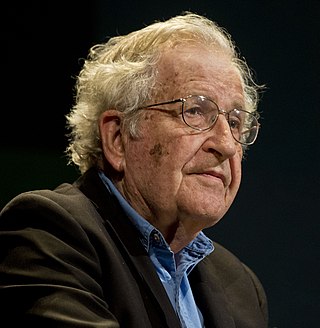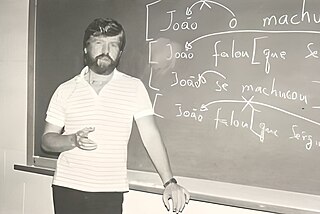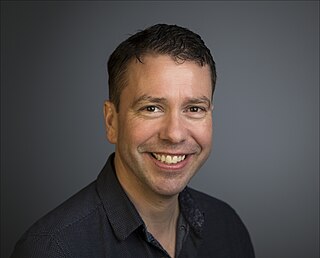Evolutionary linguistics or Darwinian linguistics is a sociobiological approach to the study of language. Evolutionary linguists consider linguistics as a subfield of sociobiology and evolutionary psychology. The approach is also closely linked with evolutionary anthropology, cognitive linguistics and biolinguistics. Studying languages as the products of nature, it is interested in the biological origin and development of language. Evolutionary linguistics is contrasted with humanistic approaches, especially structural linguistics.

Universal grammar (UG), in modern linguistics, is the theory of the innate biological component of the language faculty, usually credited to Noam Chomsky. The basic postulate of UG is that there are innate constraints on what the grammar of a possible human language could be. When linguistic stimuli are received in the course of language acquisition, children then adopt specific syntactic rules that conform to UG. The advocates of this theory emphasize and partially rely on the poverty of the stimulus (POS) argument and the existence of some universal properties of natural human languages. However, the latter has not been firmly established, as some linguists have argued languages are so diverse that such universality is rare, and the theory of universal grammar remains controversial among linguists.
Cognitive linguistics is an interdisciplinary branch of linguistics, combining knowledge and research from cognitive science, cognitive psychology, neuropsychology and linguistics. Models and theoretical accounts of cognitive linguistics are considered as psychologically real, and research in cognitive linguistics aims to help understand cognition in general and is seen as a road into the human mind.
Pirahã, or Múra-Pirahã, is the indigenous language of the isolated Pirahã people of Amazonas, Brazil. The Pirahã live along the Maici River, a tributary of the Amazon River.

Generative grammar, or generativism, is a linguistic theory that regards linguistics as the study of a hypothesised innate grammatical structure. It is a biological or biologistic modification of earlier structuralist theories of linguistics, deriving from logical syntax and glossematics. Generative grammar considers grammar as a system of rules that generates exactly those combinations of words that form grammatical sentences in a given language. It is a system of explicit rules that may apply repeatedly to generate an indefinite number of sentences which can be as long as one wants them to be. The difference from structural and functional models is that the object is base-generated within the verb phrase in generative grammar. This purportedly cognitive structure is thought of as being a part of a universal grammar, a syntactic structure which is caused by a genetic mutation in humans.
Rodney D. Huddleston is a British linguist and grammarian specializing in the study and description of English.
Geoffrey Keith Pullum is a British and American linguist specialising in the study of English. Pullum has published over 300 articles and books on various topics in linguistics, including phonology, morphology, semantics, pragmatics, computational linguistics, and philosophy of language. He is Professor Emeritus of General Linguistics at the University of Edinburgh.
The Language Acquisition Device (LAD) is a claim from language acquisition research proposed by Noam Chomsky in the 1960s. The LAD concept is a purported instinctive mental capacity which enables an infant to acquire and produce language. It is a component of the nativist theory of language. This theory asserts that humans are born with the instinct or "innate facility" for acquiring language. The main argument given in favor of the LAD was the argument from the poverty of the stimulus, which argues that unless children have significant innate knowledge of grammar, they would not be able to learn language as quickly as they do, given that they never have access to negative evidence and rarely receive direct instruction in their first language.
Principles and parameters is a framework within generative linguistics in which the syntax of a natural language is described in accordance with general principles and specific parameters that for particular languages are either turned on or off. For example, the position of heads in phrases is determined by a parameter. Whether a language is head-initial or head-final is regarded as a parameter which is either on or off for particular languages. Principles and parameters was largely formulated by the linguists Noam Chomsky and Howard Lasnik. Many linguists have worked within this framework, and for a period of time it was considered the dominant form of mainstream generative linguistics.
In linguistics, linguistic competence is the system of unconscious knowledge that one knows when they know a language. It is distinguished from linguistic performance, which includes all other factors that allow one to use one's language in practice.
Cognitive grammar is a cognitive approach to language developed by Ronald Langacker, which hypothesizes that grammar, semantics, and lexicon exist on a continuum instead of as separate processes altogether. This approach to language was one of the first projects of cognitive linguistics. In this system, grammar is not a formal system operating independently of meaning. Rather, grammar is itself meaningful and inextricable from semantics.

The term Cartesian linguistics was coined by Noam Chomsky in his book Cartesian Linguistics: A Chapter in the History of Rationalist Thought (1966). The adjective "Cartesian" pertains to René Descartes, a prominent 17th-century philosopher. As well as Descartes, Chomsky surveys other examples of rationalist thought in 17th-century linguistics, in particular the Port-Royal Grammar (1660), which foreshadows some of his own ideas concerning universal grammar.

Daniel Leonard Everett is an American linguist and author best known for his study of the Amazon basin's Pirahã people and their language.
The Port-Royal Grammar was a milestone in the analysis and philosophy of language. Published in 1660 by Antoine Arnauld and Claude Lancelot, it was the linguistic counterpart to the Port-Royal Logic (1662), both named after the Jansenist monastery of Port-Royal-des-Champs where their authors worked. The Port-Royal Grammar became used as a standard textbook in the study of language until the early nineteenth century, and it has been reproduced in several editions and translations. In the twentieth century, scholars including Edmund Husserl and Noam Chomsky maintained academic interest in the book.
In linguistics, the innateness hypothesis, also known as the nativist hypothesis, holds that humans are born with at least some knowledge of linguistic structure. On this hypothesis, language acquisition involves filling in the details of an innate blueprint rather than being an entirely inductive process. The hypothesis is one of the cornerstones of generative grammar and related approaches in linguistics. Arguments in favour include the poverty of the stimulus, the universality of language acquisition, as well as experimental studies on learning and learnability. However, these arguments have been criticized, and the hypothesis is widely rejected in other traditions such as usage-based linguistics. The term was coined by Hilary Putnam in reference to the views of Noam Chomsky.

Vyvyan Evans is a British cognitive linguist, digital communication technologist, popular science author, science fiction author and public intellectual. He has published fifteen books, both non-fiction and fiction. He holds a Ph.D. in Linguistics from Georgetown University. He is an advocate of the usage-based model of language development, the domain-general view of mind, and the importance of non-verbal, paralinguistic cues in communication—the development of emoji as a system of digital communication being a case in point. Evans is also a published science fiction author. His writing envisages a near future in which language is not learned but streamed.
Japhug is a Gyalrong language spoken in Barkam County, Rngaba, Sichuan, China, in the three townships of Gdong-brgyad, Gsar-rdzong and Da-tshang.
Jila Ghomeshi is a Persian-Canadian linguist. She earned her Ph.D. in 1996 from the University of Toronto, under the supervision of Diane Massam. She is currently a professor of linguistics at the University of Manitoba, where she has been since 1998.
Judith Tonhauser is a Professor of English Linguistics at the University of Stuttgart.
Raffaella Zanuttini is an Italian linguist whose research focuses primarily on syntax and linguistic variation. She is a Professor of Linguistics at Yale University in New Haven, Connecticut.





